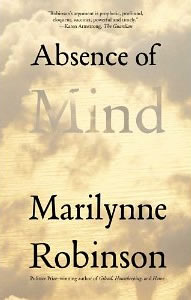Book Notes
 Marilynne Robinson, Absence of Mind; The Dispelling of Inwardness from the Modern Myth of the Self (New Haven: Yale University Press, 2010), 158pp.
Marilynne Robinson, Absence of Mind; The Dispelling of Inwardness from the Modern Myth of the Self (New Haven: Yale University Press, 2010), 158pp.
Marilynne Robinson is best known for her novel Gilead, which won the 2005 Pulitzer Prize for fiction, and its follow up volume Home (2009). In this short book, which originated as four Terry Lectures on science and religion at Yale, she critiques what I would call scientism — the belief that natural science is the only or best method of reliable knowledge about what is worth knowing. Positivism makes the epistemological claim that science is the only way to know, while materialism makes the ontological claim that the physical world is the only thing there is to know. Robinson coins the delightful word "parascience" as she takes on the "modernists" Rorty, Dennett, Pinker, Dawkins, EO Wilson and others whose specialty is a "hermeneutics of condescension."
Robinson observes that one of the chief characteristics of "parascience" is the myth of the threshold, that arbitrary and self-serving notion that we alone today know better than our unfortunate forebears who adhered to beliefs that, thanks to science, have been "exposed for all time and for all purposes as naive and untenable, supplanted by a better understanding" (22). This despite the fact that the major claimants for threshold advances in knowledge (Comte, Darwin, Marx, Freud, Nietzsche, Skinner) propose universal theories that are mutually incompatible.
These universal theories applied to all people of all time and space also ignore (or reject) one of our most basic sources of knowledge: the essential elements of experience as mediated by the conscious self: compassion and conscience, feeling and thinking, wonder and comprehension, thought and perception, art and beauty, guilt and pleasure. In Freud's "parapsychology," for example, the alienated self is not to be trusted. In evolution, the common experience of altruism remains a problem. Nevertheless, she concludes, "here we are, a gaudy efflorescence of consciousness" (109). She proposes that "the core assumption that remains unchallenged and unquestioned through all the variations within the diverse traditions of 'modern' thought is that the experience and testimony of the individual mind is to be explained away, excluded from consideration when any rational account is made of the nature of human being and of being altogether" (22). This collection of lectures does a good job of showing how and why such "parascience" fails in its account of what it means to be human.


